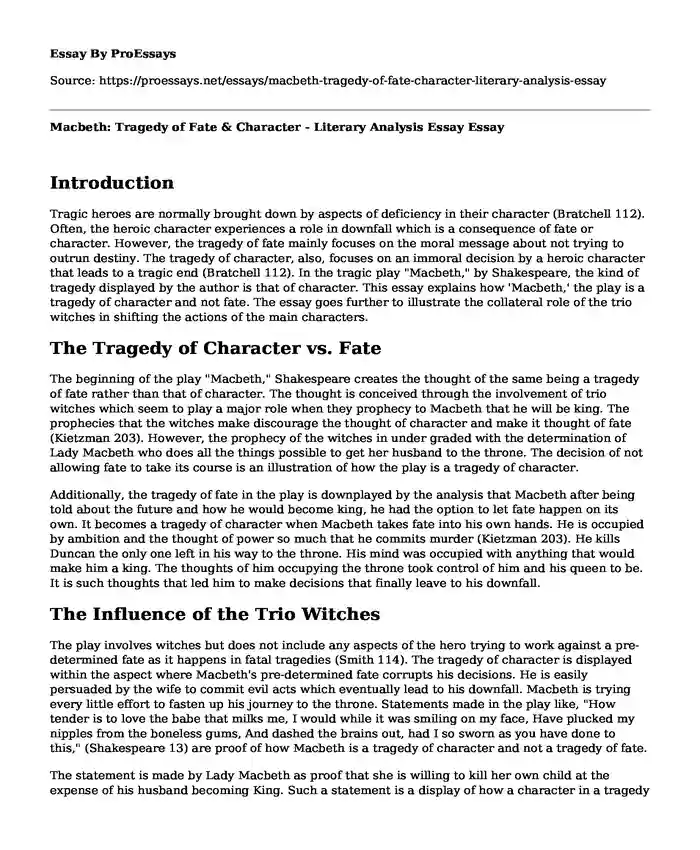Introduction
Tragic heroes are normally brought down by aspects of deficiency in their character (Bratchell 112). Often, the heroic character experiences a role in downfall which is a consequence of fate or character. However, the tragedy of fate mainly focuses on the moral message about not trying to outrun destiny. The tragedy of character, also, focuses on an immoral decision by a heroic character that leads to a tragic end (Bratchell 112). In the tragic play "Macbeth," by Shakespeare, the kind of tragedy displayed by the author is that of character. This essay explains how 'Macbeth,' the play is a tragedy of character and not fate. The essay goes further to illustrate the collateral role of the trio witches in shifting the actions of the main characters.
The Tragedy of Character vs. Fate
The beginning of the play "Macbeth," Shakespeare creates the thought of the same being a tragedy of fate rather than that of character. The thought is conceived through the involvement of trio witches which seem to play a major role when they prophecy to Macbeth that he will be king. The prophecies that the witches make discourage the thought of character and make it thought of fate (Kietzman 203). However, the prophecy of the witches in under graded with the determination of Lady Macbeth who does all the things possible to get her husband to the throne. The decision of not allowing fate to take its course is an illustration of how the play is a tragedy of character.
Additionally, the tragedy of fate in the play is downplayed by the analysis that Macbeth after being told about the future and how he would become king, he had the option to let fate happen on its own. It becomes a tragedy of character when Macbeth takes fate into his own hands. He is occupied by ambition and the thought of power so much that he commits murder (Kietzman 203). He kills Duncan the only one left in his way to the throne. His mind was occupied with anything that would make him a king. The thoughts of him occupying the throne took control of him and his queen to be. It is such thoughts that led him to make decisions that finally leave to his downfall.
The Influence of the Trio Witches
The play involves witches but does not include any aspects of the hero trying to work against a pre-determined fate as it happens in fatal tragedies (Smith 114). The tragedy of character is displayed within the aspect where Macbeth's pre-determined fate corrupts his decisions. He is easily persuaded by the wife to commit evil acts which eventually lead to his downfall. Macbeth is trying every little effort to fasten up his journey to the throne. Statements made in the play like, "How tender is to love the babe that milks me, I would while it was smiling on my face, Have plucked my nipples from the boneless gums, And dashed the brains out, had I so sworn as you have done to this," (Shakespeare 13) are proof of how Macbeth is a tragedy of character and not a tragedy of fate.
The statement is made by Lady Macbeth as proof that she is willing to kill her own child at the expense of his husband becoming King. Such a statement is a display of how a character in a tragedy of character play turns against other characters in order to achieve what he thinks is fate. At this point, the tragedy of fate ceases to be an option considering that the ones who will be affected are affected by the decision of the individual and not by the effects of fate. The several murders in the play are not at any point considered to be effects of fate but wrong incorrigible decisions made by Macbeth and his Lady.
Conclusion
From the above illustrations, it is clear that Macbeth by Shakespeare is a tragedy of character and not of fate. The analysis of the decisions made by the tragic hero is proof that his downfall is the consequences of his decision and not that of fate. The illustrations are further proof that the trio witches play a collateral role and not a major role. The witches do not directly dictate the decisions that the Macbeth family, the husband, and the wife make, which discourages thoughts of the witches playing a major role in the plans of the main character.
Works Cited
Bratchell, Dennis Frank. Shakespearean tragedy. Routledge, 2019.112-114
Kietzman, Mary Jo. "Tragic Monarchy: Saul and Macbeth." The Biblical Covenant in Shakespeare. Palgrave Macmillan, Cham, 2018. 201-234.
Shakespeare, William. The tragedy of Macbeth. Vol. 2. Classic Books Company, 2001.
Smith, Emma. "Character in Shakespearean Tragedy." The Oxford Handbook of Shakespearean Tragedy. 2016.110-116
Cite this page
Macbeth: Tragedy of Fate & Character - Literary Analysis Essay. (2023, Mar 23). Retrieved from https://proessays.net/essays/macbeth-tragedy-of-fate-character-literary-analysis-essay
If you are the original author of this essay and no longer wish to have it published on the ProEssays website, please click below to request its removal:
- Contemporary and International Issues in Business Ethics
- "Borders" Analysis Essay
- Symbols in "Hills Like White Elephants" by Ernest Hemingway
- What Is a Human? Essay Example
- Reflection Paper on MENO in the Book "Plato's Five Dialogues"
- Literary Analysis Essay on "Daystar" by Rita Dove
- Deontology: The Science of Obligation and Ethicsc - Essay Sample







